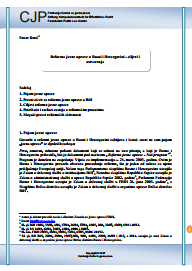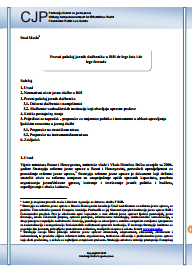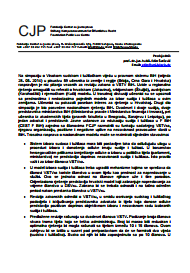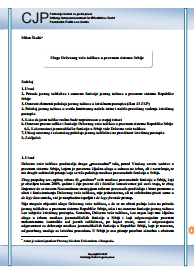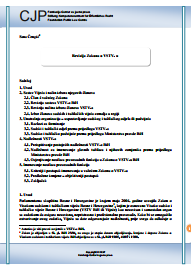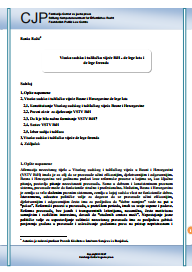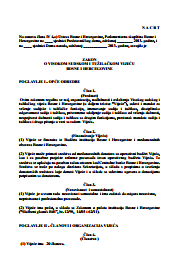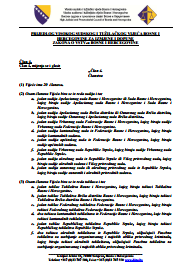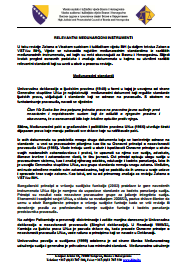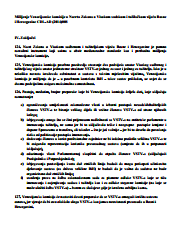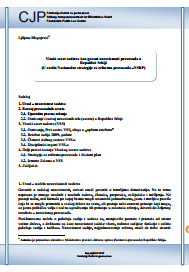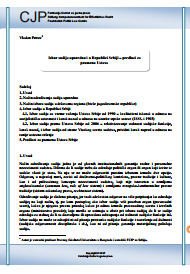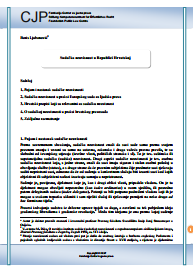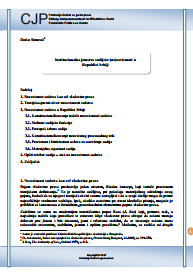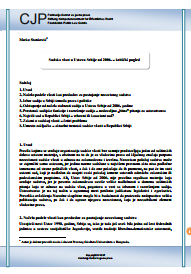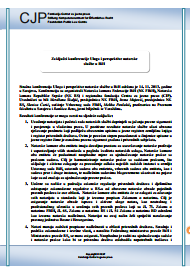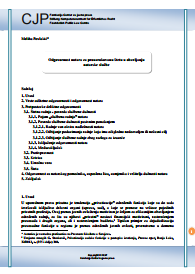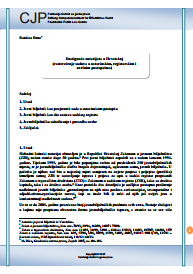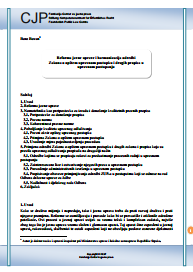
Public Administration Reform and harmonization of regulations of the Law on General Administrative Procedure and other regulations in administrative procedures
Reforma javne uprave i harmonizacija odredbi Zakona o opštem upravnom postupku i drugih propisa u upravnom postupanju
Keywords: Public law; constitution; Constitutional court; public administration; reform; regulations; harmonization; Law on General Administrative Procedure; administrative procedures; RS; ZUP;
U posljednjih nekoliko godina u Bosni i Hercegovini i njenim entitetima donesen je određen broj strategija koje bi trebale doprinijeti oblikovanju razvojnih smjernica i aktivnosti na izgradnji javne uprave prema načelima i standardima Evopskog upravnog prostora. Iz Strategije razvoja javne uprave u BiH vidljivo je da se teži dostizanju onog nivoa javne uprave kako bi se ista mogla uključiti u savremeni evropski prostor. U ovom smislu, u strategiji su naglašeni temeljni principi koji se odnose na: pravnu sigurnost i predvidljivost, otvorenost i transparentnost, odgovornost, te efikasnost i djelotvornost. Ove reforme su donesene sa zadatkom da uvedu promjene koje će obezbijediti da se poboljša koncet i uloga javne uprave na svim nivoima vlasti u BiH. Tako je, prema novom talasu reforme javne uprave, u Izmjenama i dopunama Zakona o lokalnoj samoupravi Republike Srpske ugrađen institut menadžera koji koordinira rad na pripremi i realizaciji razvojnih programa i projekata kojim se podstiče ekonomski razvoj, obezbjeđuje zaštita životne sredine, održivi razvoj, podstiču preduzetničke inicijative, javno-privatno partnerstvo, i inicira izmjene propisa radi ostvarivanja postojećeg ambijenta za razvoj jedinica lokalne samouprave. Sve ovo ukazuje da javnu upravu treba reformisati na način da ona bude na usluzi građana i da pronalazi dobra rješenja, te da vodi računa o opštem dobru, jer samo država može provesti opšte dobro. Dosadašnji rezultati i provedene studije pokazuju spor napredak u sprovođenju reformi javne uprave u BiH. Poseban naglasak u ovom radu dao sam na na jedan od šest reformskih pravaca iz ove strategije, a odnosi se na poboljšanje kvaliteta upravnog odlučivanja. U radu sam ukazao i na određene nedostatke koji su se pokazali kod primjene u praksi pojedinih odredbi ZUP-a kao opšteg procesnog zakona pri odlučivanju u pojedinačnim upravnim stvarima, te na određene nedostatke koji ukazuju na nedovoljnu harmonizaciju pojedinih odredbi nekih posebnih propisa koja su pravila upravnog postupanja i odlučivanja propisala na drugačiji način. U smislu otklanjanja navedenih nedostataka i nepravilnosti koje se odnose se na oblasti primjene propisa koji uređuju procesna pravila kao i postupanja organa i službenih lica pri rješavanju pojedinačnih upravnih stvari, predlažem: 1. Uskladiti odredbe čl. 1 ZUP-a i čl. 1 ZUS-a na svim nivoima u BiH sa odredbama Zakona o upravi, Zakona o republičkoj upravi, Zakona o lokalnoj samoupravi i Zakonom o principima lokalne samouprave Federacije BiH, i drugim propisima na način da određeni termini imaju ista značenja, kao što su termini: organi državne uprave, organi i organizacije koje vrše javna ovlaštenja, javne institucije, javna tijela, povjeravanje i prenošenje javnih ovlaštenja, i sl. 2. Uskladiti značenje termina Službeno lice iz čl. 6 Izmjena i dopuna Zakona o opštem upravnom postupku Republike Srpske u vezi sa čl. 31a i 31b ovog zakona, sa terminom službenika iz čl. 2 Zakona o državnim službenicima, i čl. 37 Zakona o izmjenama i dopunama Zakona o lokalnoj samoupravi, a u vezi sa čl. 111 Zakona o lokalnoj samoupravi, a sve u smislu ispunjavanja uslova pod kojima se ovoj kategoriji zaposlenih mogu dati ovlaštenja za vođenje upravnog postupka i za donošenje rješenja u pojedinačnim upravnim predmetima. 3. Uskladiti odredbe Glave IV Poglavlja 4 koje propisuju rokove za razgledanje spisa i obavještavanje o toku postupka, sa odredbama glave V ZUP-a, koje regulišu oblast računanja rokova u upravnom postupku. 4. Odredbe ZUP-a Republike Srpske koje propisuju rokove za rješavanje pojedinačnih upravnih stvari u prvostepenom i drugostepenom upravnom postupku uskladiti sa odredbama Zakona o upravnim sporovima, koje propisuju rokove kod podnošenja tužbe zbog ćutanja administracije. 5. Izmijeniti odredbe ZUS-a BiH i ZUS-a Federacije BiH, kojima je propisan rok za donošenje rješenja po presudi nadležnog suda u upravnom sporu, kada organ donosi rješenje u ponovnom postupku, u skladu sa pravnim shvatanjem suda i primjedbama u pogledu postupka, sa 15 na 30 dana. 6. U glavi XIV, poglavlju koje govori o pravu na žalbu, propisati „Pravo stranke da se u toku trajanja roka za žalbu može odreći prava na žalbu“, kako bi ista mogla što prije ostvariti pravo na klauzulu pravosnažnosti. 7. U glavi XVII ZUP-a BiH i Federacije BiH, koja govori o Izvršenju rješenja i zaključaka u upravnom postupku, potrebno je brisati odredbu kojom je propisano „da se nakon pet godina od dana kada je rješenje postalo izvršno, ne može tražiti njegovo izvršenje“. 8. Usaglasiti odredbu čl. 43 st. 2 Zakona o inspekcijama Republike Srpske koja uređuje položaj i ulogu drugih lica u upravnom postupku sa odredbama ZUP-a koja propisuju svojstvo stranke u upravnom postupku i njenih prava utvrđenih u načelu zaštite prava stranaka i zaštite javnog interesa. 9. Neophodno je odredbe glave XVII ZUP-a, koje govore o izvršenju u upravnom postupku, dopuniti odredbom koja se odnosi na provođenje prinudnih administrativnih izvršenja, u smislu propisivanja obaveze organima koji su nadležni za donošenja zaključaka o dozvoli izvršenja i provođenje prinudnih administrativnih izvršenja pojedinačnih rješenja u upravnom postupku, „da provedu postupak izbora izvršioca, ukoliko izvršenik u ostavljenom roku iz zaključka o dozvoli izvršenja ne izvrši naloženu radnju izvršenja“. 10. Usaglasiti odredbe čl. 66 i 70 st. 3 Zakona o inspekcijama u Republici Srpskoj kojima je propisano da „Nakon što inspektor utvrdi da izvršenik nije izvršio mjere izrečene u rješenju ili ih je izvršio samo djelimično, obavještava izvršenika da je rješenje postalo izvršno i navodi način prinudnog izvršenja rješenja, u zavisnosti od prirode izvršenikove obaveze“, sa odredbama glave XIII i XVII ZUP-a Republike Srpske. 11. Odredbe ZUP-a Republike Srpske potrebno je dopuniti odredbama posebnog poglavlja koje propisuje obaveze organa i službenih lica koje se odnose na mjere za sprovođenje ovog opšteg procesnog zakona, kao i odredbe o nadzoru, i kaznene odredbe kojima se propisuju sankcije za nepridržavanje odredbi ovog zakona. Svi prijedlozi koji su dati u ovom radu izneseni su sa namjerom kako bi se došlo do što ujednačenijih propisa koji se odnose na javnu upravu, kao i poboljšanje kvaliteta upravnog odlučivanja.
More...
